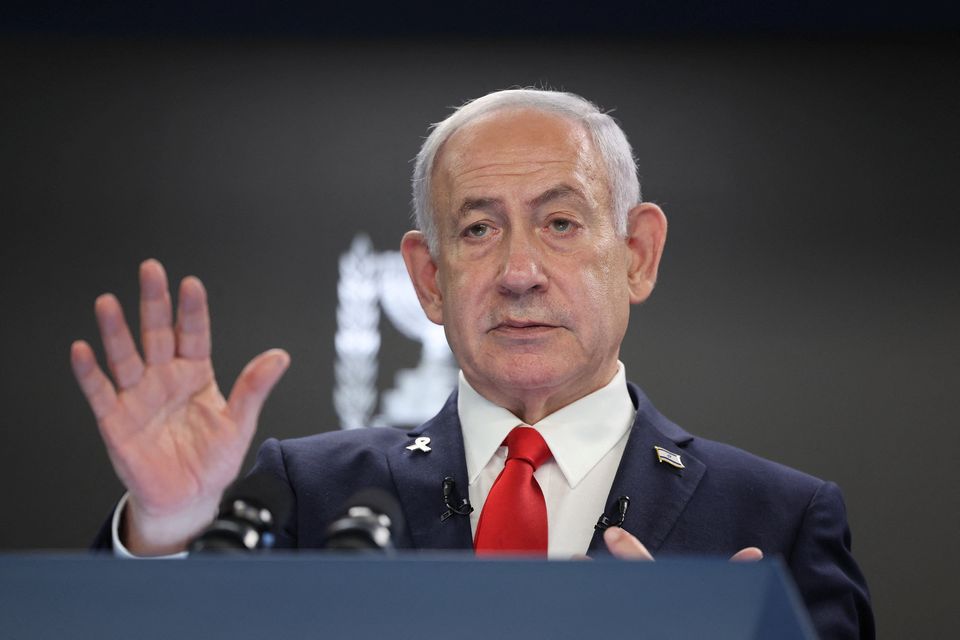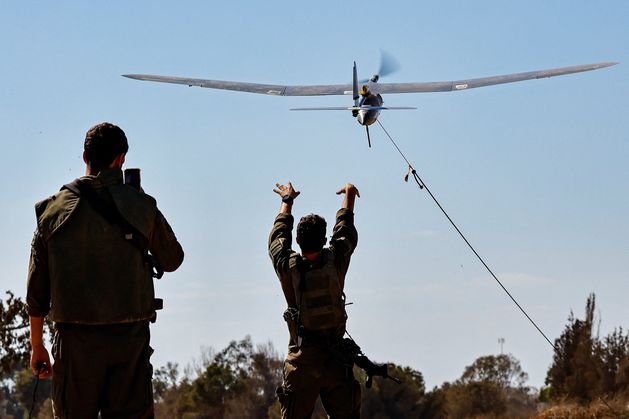At least 100 people killed in strikes yesterday, while 13 more Palestinians died of hungerMeanwhile, Spanish PM says Europe’s Gaza response has been a ‘failure’
Palestinian health authorities said further Israeli airstrikes and shelling across the Gaza Strip had killed at least 100 people yesterday, 35 of them in Gaza City in the enclave’s north as Israeli forces girded for the offensive.
Israeli Army Radio said 40,000 reservists would report for duty yesterday.
Israel’s security cabinet, chaired by Mr Netanyahu, approved a plan last month to expand the nearly two-year-old military campaign in Gaza to take control of Gaza City, which Israeli forces stormed early in the war and waged fierce urban warfare with Hamas. Israel currently holds about 75pc of the Gaza Strip.
A security cabinet meeting late on Sunday included angry exchanges between Mr Netanyahu and his ministers, who want to expedite the offensive, and Israel Defence Forces (IDF) chief Eyal Zamir, who has urged the politicians to reach a ceasefire deal with Hamas.
Mr Zamir said a military thrust into Gaza City would endanger hostages and further strain the already overstretched army, according to four ministers and two military officials present at the meeting.
The IDF chief has clashed with the cabinet before. Mr Netanyahu said on August 20 that he had ordered a faster push to take Gaza City, but the next day the military said hostages could be endangered, and that any offensive could not begin for two months, according to a source in Mr Netanyahu’s circle and a defence official.
I don’t feel like I’m doing anything that really applies significant pressure to have Hamas release the hostages
The military said more time was needed for aid to civilians in Gaza, where starvation has spread. But surveys have also shown many reservists are unhappy with the cabinet’s plans, some openly accusing the government of lacking a cohesive strategy, a post-war plan for Gaza or a clear benchmark for victory.
“I don’t feel like I’m doing anything that really applies significant pressure to have Hamas release the hostages,” one combat reservist who has been serving in Gaza since October 7, 2023, when the war began, told Reuters, speaking on condition of anonymity.
Though Mr Zamir has publicly questioned the wisdom of a new offensive, he told reservists at one military base yesterday that the army was prepared for nothing less than “decisive victory” and would not stop the war until then.
“We are preparing for the continuation of the war; we are going to increase and enhance the strikes of our operation, and that is why we called you,” he said.
“We have already begun the ground operation in Gaza – make no mistake. We are already entering places we have never entered before.”

Israeli prime minister Benjamin Netanyahu. Photo: Reuters
Gaza health authorities said at least 100 people had been killed by Israeli airstrikes, tank shelling and gunfire across the coastal enclave with scores more wounded yesterday.
Among the dead was local journalist Rasmi Salem, medics said.
The Hamas-run Gaza government media office put the number of Palestinian journalists killed by Israeli fire in Gaza since the war began at 248.
Outside Gaza City’s Al-Shifa Hospital, white plastic body bags with corpses were laid out on the street.
Crowds wailed for their relatives who had been killed.
“We fled with nothing. They went to get clothes and food from their homes, to bring clothes for their children and food for themselves… and look now. They came back as martyrs,” Nasr Nasr, a relative of some of the dead, said.
The Israeli military did not immediately respond to a request for comment, but has stated that its forces are fighting militants on the outskirts of Gaza City, destroying tunnels and militant infrastructure and seizing weapons.
Other deaths reported yesterday included five people who were in a line waiting for food at an aid-distribution hub in southern Gaza, Palestinian medics said.
Thirteen more Palestinians, including three children, had died of malnutrition and starvation in Gaza over the last 24 hours, the territory’s health ministry said yesterday.
That raised officially reported deaths from such causes to at least 361, including 130 children, the vast majority in recent weeks.
Israel disputes the hunger fatality figures given by the health ministry of the Hamas-run government, arguing that many deaths were due to other medical causes.
The war began on October 7, 2023, when gunmen led by Hamas attacked southern Israeli communities near the border, killing some 1,200 people, mainly civilians, and taking 251 hostages including children into Gaza, according to Israeli figures.
Over 62,000 Palestinians have been killed in Israel’s air and ground war in Gaza since then, according to Gaza health officials, who do not say how many were militants but have said most of those killed have been women and children.
Ceasefire talks ended in deadlock in July.
Of the 48 remaining hostages in Gaza, Israeli authorities believe that 20 are still alive.
Response
Meanwhile, Europe’s response to the conflict in Gaza has been a “failure” and risks undermining its global credibility, according to Spain’s prime minister.
Ahead of a meeting with Keir Starmer in London, Pedro Sanchez – the first European leader to accuse Israel of committing genocide in Gaza – told The Guardian the conflict represents “one of the darkest episodes of international relations in the 21st century”.
“It is a failure,” he said. “Absolutely. It is also the reality that, within the EU, there are countries that are divided when it comes to how to influence Israel.
“But in my opinion, it’s not acceptable and we can’t last longer if we want to increase our credibility when it comes to other crises, such as the one we face in Ukraine.”
His comments come days after local health officials said 31 people were killed in strikes across the Gaza Strip as Israel presses ahead with a major military offensive.
On Monday, British Foreign Secretary David Lammy told UK parliament that the country still intends to recognise a Palestinian state in September, joining Spain and other European nations.
Mr Sanchez said the US, under President Donald Trump, was ending the international order established after the Second World War.
But he suggested the US withdrawal from major institutions such as the World Health Organisation could create an opening for Europe and the UK to assert greater global leadership.
“The most shocking reality that we’re facing is that the principal architect of the international order – which is the US after the Second World War – is now weakening this international order, and that’s something that’s not going to be positive for US society or for the rest of the world – especially western countries,” he said.
“That is why I think there’s an opportunity for the European Union and also for the UK.”
Mr Sanchez and Mr Trump clashed earlier this year over Spain’s country’s refusal to spend 5% of its GDP on defence, but the prime minister insisted his country would be a “reliable” Nato partner.
He also spoke of the “dilemma” western societies increasingly faced when deciding how to handle immigration.
“I believe that the vast majority of citizens in Spain understand quite well that migration is also an opportunity and not only a moral duty,” Mr Sanchez said.
“It’s an opportunity to respond effectively to the challenges that we are facing when it comes to economic growth and when it comes to the labour market or helping to finance our welfare state in the present and the future.”

